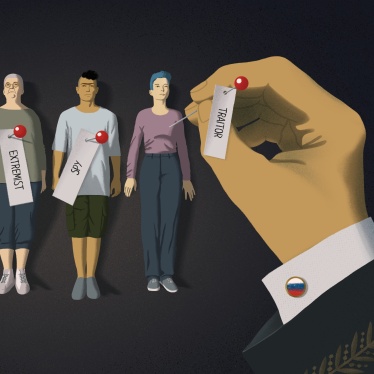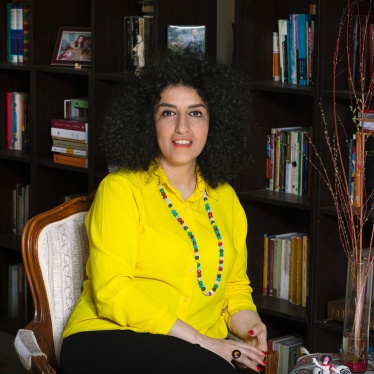(New York) - Uzbek authorities should immediately free the independent journalist Dilmurod Saidov, sentenced on July 30, 2009, to 12 1/2 years in prison following a flawed trial brought on politically motivated charges, Human Rights Watch said today. The trial was riddled with procedural violations, and several witnesses ultimately withdrew their testimony, saying they had given false evidence, rendering his conviction fundamentally unsound.
Human Rights Watch and local human rights defenders believe that Saidov (pen name Sayyid) was prosecuted and convicted because of his efforts to expose local officials' abuse of power and corruption and his willingness to fight for the rights of farmers in the Samarkand region. Uzbekistan has frequently jailed human rights defenders for their human rights activities.
"Dilmurod Saidov is well known for his courageous work to expose rampant corruption in Uzbekistan, and this conviction is clearly an attempt to stop him," said Holly Cartner, Europe and Central Asia director at Human Rights Watch. "The trial was a travesty of justice, and Saidov should be freed immediately."
Saidov was convicted of extortion and forgery in a closed session at the Tailak District Court. Neither Saidov's lawyer, Ruhiddin Komilov, nor his public defender, Abdurakhman Tashanov, nor his family members were informed of the trial date in advance. Vasila Inoyatova, director of the human rights group Ezgulik, told Human Rights Watch that she asked the court secretary why the sentencing was closed, and was told that it was "in the interest of security." No further explanation was given.
Saidov is an independent journalist who has worked for years to expose corruption, abuse of power, and the general social and economic situation in the Samarkand region. His articles have been published in many local newspapers, as well as by the internet-based news agency that reports on human rights violations in Central Asia, Voice of Freedom, among others. Saidov is a member of the Tashkent Regional Branch of Ezgulik, and since 2004 he has been actively helping farmers defend their rights in the Samarkand region. In addition, for several months in 2008 he was a member of the Rapid Response Group, which works to prevent torture in Uzbekistan.
Flawed Trial and Rescinded Statements
Saidov was arrested on February 22 at his home in Tashkent and accused of extortion on the basis of a statement by Asliddin Urinboev, the head of the Agricultural Equipment and Tractor Park in the Djambai district of Samarkand Region. Urinboev alleged that, on February 17, Saidov had sought to extort US$15,000 from him with the help of Marguba Juraeva, whose father, a farmer, had reportedly filed complaints about the company.
Juraeva was also arrested on February 22 at Yulduz, a restaurant in Samarkand. She was arrested immediately after Urinboev reportedly handed her US$10,000 in cash, and was later charged with extortion. During the interrogation, she gave written testimony indicating that she had committed the act on Saidov's behalf. The following day, she reportedly rescinded her testimony, saying she had given it under the influence of alcohol.
At the request of the Samarkand prosecutor's office, Saidov was later transferred from Tashkent to Samarkand to stand trial. During the investigation and trial, he was held in several detention centers, including Pretrial Detention Facility (SIZO) 64/7 in Kattakurgan.
In mid-March, a second charge of extortion (under article 165(2) of the criminal code) was brought against him, on the basis of a statement made by Saidullo Boimuradov, head of a former privatized collective farm called "Uzbekistan" in the Djambai district. He claimed that, in 2004, Saidov had tried to extort US$5,000 from him. Boimuradov provided no evidence to support his allegation, but the authorities nevertheless added a second extortion charge against Saidov, his lawyer said.
In April 2009, Saidov was also charged with forgery on the basis of accusations made by Djambai farmers. They claimed that he had falsified documents giving him a power of attorney to represent them in filing complaints with the authorities.
The trial against Saidov, Juraev, and two farmers also accused of involvement in the alleged extortion - Anorkul Pulatov and Tura Ergashev - began on June 1. Saidov's public defender, Abdurakhman Tashanov, said that Pulatov and Ergashev had asked for an investigation into the activities of officials connected to Urinboev's company, the Agricultural Equipment and Tractor Park, and had subsequently submitted complaints against the company accusing it of illegal land confiscation. Tashanov believes this is the reason they were detained as Saidov's accomplices.
Komilov also said that the prosecution based its case against Saidov only on written testimony of his involvement in the alleged crimes, much of which had later been rescinded. The other co-defendants were also convicted: Pulatov to 12 years, and Ergashev and Juraeva to 11 years each.
The investigation and trial were riddled with inconsistencies and violations of fair trial standards. Court hearings were repeatedly conducted without notice to Saidov's defense lawyer. For example, a hearing was held in Samarkand City Court on February 25 to determine whether there had been sufficient evidence for Saidov's arrest. However, in violation of Uzbek law, Saidov's lawyer was not informed of the hearing and was therefore not present when the evidence was reviewed. He appealed the decision, but was not informed of that hearing either.
In a letter written from detention in March, Saidov described the initial confrontation (ochnaya stavka, a process whereby two witnesses or suspects with different stories confront each other as part of the initial investigation) between himself and Juraeva the day after her arrest. He wrote that Juraeva renounced her previous testimony against Saidov, and stated that she had been intoxicated at the time of her arrest. Reportedly, the prosecution did not include this information in court materials presented during the hearing on February 25 to determine whether to issue a warrant for his arrest.
Komilov, the defense attorney, said that six of the 10 farmers who had initially claimed that Saidov forged the power of attorney testified at the trial that their original testimony had been false. One, Murtazo Pulatov, testified that he had been detained and held for two days in a pretrial detention facility to pressure him to make allegations against Saidov, Komilov said.
Juraeva reportedly testified that the testimony she gave the day she was arrested about acting on behalf of Saidov, was false. She reportedly testified that she had been drinking when she was arrested and therefore "didn't know what she wrote." She reportedly said that Saidov had had nothing to do with an act of extortion and should be released.
Komilov also reported that many documents that the defense handed over to the investigator during the pre-trial investigation, such as the original notarized copy of Saidov's power of attorney from the farmers, disappeared during the trial.
Saidov suffers from acute tuberculosis, for which he needs regular medical treatment.
Human Rights Watch is also concerned about Saidov's health and called on the prison authorities to provide immediately the systematic medical attention he needs.
During the investigation, Ezgulik submitted formal petitions to the Samarkand Regional Prosecutor's Office, the Samarkand District Court, and the Prosecutor General of Uzbekistan, requesting that Saidov be released from detention to allow him to get proper treatment. Reportedly, Ezgulik was informed that its concerns were unfounded. A similar request that he be released from the SIZO was made during his trial in court, but according to his public defender, the judge dismissed it.
Background
For over five years, Dilmurod Saidov has been an outspoken critic of abuse of power and is well known for his investigative journalism exposing the corruption of local officials.
Komilov, the defense attorney, said that the 10 farmers met with Saidov in the spring of 2008 and asked him to investigate the alleged theft and misappropriation of agricultural machinery and land by Urinbaev's company. On August 24, the farmers gave Saidov a notarized power of attorney to represent them,
He went to the Djambai district to investigate the farmers' allegations. After finding evidence that substantiated their claims, he submitted a series of complaints to government bodies and published a number of articles in local newspapers about the case. According to Saidov's March 2009 letter from detention, from September 3, 2008 to February 16, 2009, he wrote more than 10 complaints and statements, which he submitted to various government bodies, including the Samarkand Regional Hokimiyat, (regional government building), the Samarkand Prosecutor's office, and the prosecutor general of Uzbekistan.
In November 2008, as a result of the evidence Saidov and the farmers submitted to Olim Tohirov, an investigator at the Djambai district Department of Internal Affairs, a special commission was created to review their complaints and to conduct an inspection of the Agricultural Equipment and Tractor Park. The commission consisted of representatives of the Djambai district tax authorities, the prosecutor's office, the police, and Saidov himself.
The commission carried out an inspection of the Agricultural Equipment and Tractor Park, but no one was prosecuted for any violations investigated by the commission, Komilov said.
Crackdown on other activists, journalists, and human rights defenders
Independent civil society activism in Uzbekistan remains severely restricted, with authorities detaining and threatening with prosecution human rights defenders, journalists, and others for their peaceful activism. Civic activists are frequently charged with and convicted on the basis of trumped-up allegations and fabricated evidence, with complete disregard for the facts of the case or for fair trial standards. Many human rights defenders and other activists have had to flee the country out of fear for their security or that of their loved ones. The authorities also continue to block the activities of local and international nongovernmental organizations.
As of this writing, the government continues to hold at least 13 human rights defenders and independent journalists in prison for no reason other than their legitimate human rights work. They are: Solijon Abdurakhmanov; Azam Formonov; Alisher Karamatov; Jamshid Karimov; Norboi Kholjigitov; Abdusattor Irzaev; Habibulla Okpulatov; Nosim Isakov; Rasul Khudainasarov; Yuldash Rasulov; Dilmurod Saidov; and Akzam Turgunov. Many other civic activists, independent journalists, and political dissidents are also serving prison sentences on politically motivated charges, including political opposition leader Sanjar Umarov and poet and political dissident Yusuf Jumaev.
Worrying, credible reports that a number of imprisoned activists are suffering severe health problems as a result of poor conditions and ill-treatment in Uzbekistan's notoriously abusive prison system underscore the urgency of securing their immediate and unconditional release.







